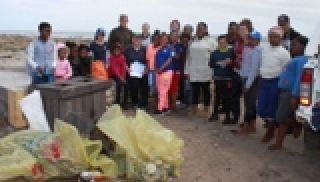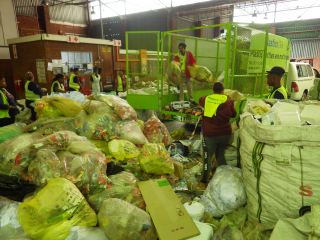PLASTICS INDUSTRY RELEASES RESULTS OF 2017 INTERNATIONAL COASTAL CLEAN-UP
Plastics|SA, the umbrella body representing the local plastics industry and local coordinator of the annual International Coastal Clean-Up volunteer efforts, has released the audited results of the biggest pollutants found on our beaches during 2017.
Thousands of volunteers around the country participated
According to John Kieser, Sustainability Manager of Plastics|SA and coordinator of the clean-ups that took place in the Cape Provinces, the past few months were spent compiling and analysing the datasheets that were filled in by more than 30 000 volunteers. Throughout the year Plastics|SA distributed nearly 350 000 bags used for clean-ups nationwide. 16 298 volunteers helped to remove more than 5 tons of litter from beaches in the three Cape Provinces alone, whilst approximately 8 000 volunteers participated in KZN. Several thousands of volunteers also participated in clean-ups hosted inland to clean rivers and water sources.
“The information we get from these clean-ups are relayed and used by international organisations such as Ocean Conservancy to provide an item-by-item, location-by-location snapshot of marine debris. As a signatory of the Declaration of the Global Plastics Associations for Solutions on Marine Litter, this information has become an integral part of Plastics|SA’s ongoing clean-ups and education campaigns,” Kieser explained.
Single use packaging items continue to be biggest pollutants
Broken down plastic pieces, food wrappers, containers, as well as bottle caps and lids continue to be the most commonly found, post-consumer waste items on our country’s beaches. This is clearly showing that we are dealing with human behaviour that needs to be addressed and corrected,” Kieser said.
more 2/…
icc results 2017 two
Communities getting their hands dirty
The Plastics|SA results have also shown a year-on-year increase in the number of regular beach clean-ups which are being initiated and driven by communities and volunteers. This past year has seen more clean-ups taking place in areas where little or no area cleansing is done by local authorities (i.e. informal settlements); whilst large groups of school children from these and other areas continue to participate in organised clean-ups around the provinces.
“These community efforts have a domino-effect and definitely contribute to less litter ending up on our beaches. It is wonderful to have so many different voices from all walks of life speaking out against littering and illegal dumping, and neighbourhoods taking responsibility for their own actions. This has also highlighted the growing need for groups to sort material for recycling purposes, improve waste management systems and for more recycling facilities to be established around the country,” Kieser said.
A growing awareness of marine litter
Kieser said that regular beach clean-ups help to create a growing awareness of the negative impacts of marine litter on the environment, and also allow for a closer monitoring of the problem. Thanks to the ongoing commitment of organisations such as Ocean Conservancy, the United Nations Environmental Program (UNEP), the National Oceanic and Atmospheric Administration (NOAA), the African Marine Waste Network, KZN Marine Network and Plastics|SA, more people in Africa, and specifically southern Africa, are familiar with the issue of marine debris.
“Plastics are valuable and make our modern lives convenient and easy. However, they should be disposed of responsibly in order to be recycled and never end up in our landfills, much less in our waterways or oceans. Never before has the issue of plastics in our oceans received so much attention. Consumers, politicians and industry leaders such as Plastics|SA are uniting their efforts and their voices around the globe to ensure that we protect our marine life from plastic and other packaging materials - which are threatening their natural habitats and therefore also their survival,” Kieser says.
Campaigns to highlight dangers of marine pollution
Starting in April 2018, Plastics|SA will be launching a new advertising campaign on radio, television and on social media platforms aimed at spreading the message against marine pollution. The association will also be participating in the World Clean-up Day taking place on 15 September 2018 - an initiative of the “Let’s Do It” campaign. 150 countries will clean up illegal waste on this day as part of a global, civic-led “green wave” starting in New Zealand and ending in Hawaii.
“We are encouraging South Africans to be mindful of the impact their actions have on ensuring the health and future well-being of our oceans, and the many beautiful creatures who live in it. Carelessly discarded plastic breaks down into small particles that look like food. When eaten, these particles harm sea creatures from tiny fish to large whales. However, as an industry and as a nation, we have the power to turn the tide on marine litter and take positive action that will benefit future generations to come!” Kieser concludes.
For more information, visit www.plasticsinfo.co.za or www.coastalcleanupdata.org
ENDS
Note to the editor:
The 2017 International Coastal Clean-Up was made possible thanks to the financial commitment from the following sponsors: Coca-Cola Beverages, Let’s Do It, Kelpak, Pick n Pay, PETCO (PET Recycling Company), POLYCO (Polyolefin Responsibility Organisation), SAVA (SA Vinyls Association) and Polystyrene Association, Packaging SA, Engen, Tuffy Manufacturing, Woolworths, ABI, Garbie, Dow Chemicals, National Recycling Forum, Glass Recycling Company, Collect-a-Can, Paper Recycling Association of SA, Tetrapak, ROSE Foundation, Brand SA, Nelson Mandela Foundation, Department of Environmental Affairs.
Waste Management and Route Cleaning at 2018 MTB Challenge and Cape Cycle Race
A dedicated Plastics|SA clean-up team consisting of more than 100 workers employed from informal settlements around Cape Town, once again worked tirelessly to ensure the race routes used for the recent 2018 Cape Town Cycle Tour and Mountain Bike Challenge were kept clean and litter-free.
Under the guidance of John Kieser, Sustainability Manager of Plastics|SA, this was the 11th consecutive year that the team was responsible for the area cleansing and waste management of the road race and the 7th year that they were also given responsibility for the Mountain Bike Challenge.
“I think we can rightly say that this clean-up crew should be considered race veterans by now and that they have an intimate knowledge of every hill, valley, twist and turn of the routes,” Kieser says.
The primary goal of the clean-up crews is to ensure that the waste generated and left behind by cyclists and spectators on race days, is collected as quickly and efficiently as possible. Besides ensuring minimal disruption to other cyclists and traffic, the waste is also removed and recycled in line with the overall goals of the environmental policies of the areas impacted by the sport events.
Less water, more energy sachets
Owing to the water shortage in Cape Town, cyclists used more energy drinks in multi-layered sachets (known as “Gue”). Kieser reports that the littering of this material was notably larger than in previous years. As a result, their final sweep of the race route on the Monday after the Cycle Tour, took much longer than usual.
Raising awareness of litter and the importance of recycling
“The active and visible involvement of the Plastics|SA clean-up team and the red PETCO-branded bins and truck at these annual events are most certainly helping to create an awareness of the mountains of litter generated at big events such as these and the importance of recycling,” Kieser said.
With the support of waste management company WastePlan, more than 10 truckloads of waste consisting mainly of energy drink sachets and other high value plastic waste was collected and removed for recycling.
“We are deeply thankful that we experienced favourable weather conditions this year, and for the organisers and sponsors who provided funding, clothing and food parcels for the clean-up teams. It is always a pleasure working with a team such as this, which has to operate under great stress. A wonderful atmosphere was experienced along the way and we all felt that we had the privilege of being part of something truly wonderful,” Kieser concluded.
For more information, please visit www.plasticsinfo.co.zaThe Plastics SA clean-up crews will again be in action at the Old Mutual Two Oceans Marathon (OMTOM) that will be taking place on 31 March 2018



